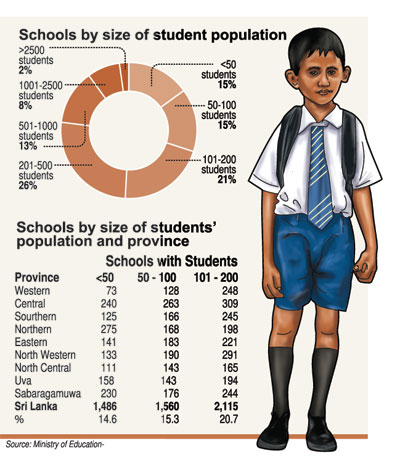News
Popular schools allowed to open branches
In a move to meet high demand for Grade 1 admission to popular schools, cabinet has approved a government proposal to allow popular semi-government schools such as St Peter’s College, Colombo to establish branches across the country.
A total of 36 popular semi-government schools including St Peter’s, St Joseph’s College and Wesley College in Colombo, Maris Stella College and Loyola College in Negombo, Holy Cross College, Kalutara and Christ King College, Pannipitiya are allowed to build five branches each around the country, according to cabinet paper No. 18/0850/742/017 of April 26, 2018.
 Already these schools have established nine branches in Negombo, Wattala, Katunayake, Bopitiya and Kalutara.
Already these schools have established nine branches in Negombo, Wattala, Katunayake, Bopitiya and Kalutara.
Critics say this move flies in the face of government policy and is a denigration of local schools in regional areas.
The move undercuts the development of government schools, the Ceylon Teachers Union (CTU) said. Allowing popular schools to extend services is against the policy, “The nearest school the best school” by which the government urged parents to admit their children to schools within a 5km radius of their homes, the union said.
The policy, introduced in June 2016 by Education Minister Akila Kariyawasam under the direction of Prime Minister Ranil Wickremesinghe, carried the aim of identifying and developing all schools in the country to provide equal education opportunities.
It undertook that the needs of each school would be identified and attention given to all construction and repair requirements, human and resource development and provision of goods and services.
CTU General Secretary Joseph Stalin said allowing popular schools to build branches across the country would result in several existing schools being closed.
The issue has highlighted dilemmas facing the government and government schools.
There were no requests for Grade 1 admission for this year in 350 schools, according to Education Ministry data collected by the Department of Census and Statistics. In 2017, 433 schools did not receive enough applications for Grade 1 admission for 2018, with 137 schools receiving only one application and 138 schools receiving two applications.
Also, 3,046 schools have fewer than 100 students, including three schools in Colombo which have fewer than 15 students, and the next most populous district, Gampaha, having three schools with fewer than 30 students.
In total, 1,100 government schools received fewer than five Grade 1 applications each while 2,330 schools received fewer than 10 applications. In the Ratnapura district, 49 schools did not receive a single application. In the Western Province, 19 schools did not receive a single application.
 Mr. Stalin said due to a lack of basic facilities, parents were reluctant to admit their children to these schools, mainly in rural areas. Around 165 government schools operated without even the provision of drinking water and toilet facilities and 4,550 schools lacked computer facilities.
Mr. Stalin said due to a lack of basic facilities, parents were reluctant to admit their children to these schools, mainly in rural areas. Around 165 government schools operated without even the provision of drinking water and toilet facilities and 4,550 schools lacked computer facilities.
The cabinet paper also allows the government to pay teacher wages to 13 private schools that do not currently receive assistance from the government.
There are 80 government-approved private schools of which 36 schools are given assistance, and 44 government-approved unaided schools.
An official of the Private Schools Branch of the Education Ministry said initially 13 schools with a total of 10,366 students had sought assistance from the government but one school in Kandy had withdrawn its request.
The 13 schools across the country include Sri Sumeda Vidyalaya, Gampaha, Bolawalana Ave Maria Vidyalaya, Negombo, Nalanda Buddhist Vidyalaya, Kundasale, Suradithika Balika Vidyalaya Paiyagala, Siri Sumana Buddhist Vidyalaya Biyagama, N.C.E.F. Buddhist Vidyalaya, Mulleriya, Minerva Vidyalaya, Matara, Sri Rahula, Anuradhapura, Sinhala Buddhist Vidyalaya, Matale, Western Province Jaya Indrasiri Vidyalaya, Pitakotte, Mahamvenawa Buddhist Vidyalaya, Kurunegala and Vidyani Vidyalaya, Kelaniya.
The approved cabinet paper entitles 381 teachers at these schools to be paid a colossal sum of Rs. 160 million a year in total.
This, Mr. Stalin said, is an additional burden for the cash-strapped Education Ministry and the money could be used productively to upgrade and provide facilities for schools in rural areas.
“We see this as a move to privatise schools. The government is using varying ruses to privatise education,” he said.

